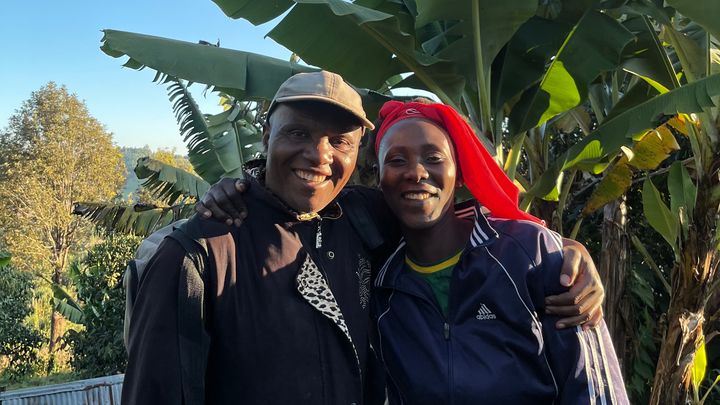
Help raise 3000€ for a solar water pump in Tanzania!
Donation protected
Karibu! Welcome :)
My name is Ottoman, and I am passionate about permaculture and living a self-sustaining lifestyle. This passion led me to create a permaculture project with my family in the southern highlands of Tanzania, in a rural village called Ikanga, home to 3,000 people. The project, called Kukua Practical Permaculture Africa (KPPA), spans 33 acres. "Kukua" in Swahili means "growth," which symbolizes our goal not only for this farm but also for our community as a whole. Our mission is to uplift our community by creating jobs, improving nutrition and food supply, and educating people about permaculture to help them better utilize their lands.
But first of all: what is permaculture?
Permaculture, the combination of the words ‘permanent agriculture,’ is a design system for creating sustainable human environments, created by Bill Mollison in 1978. In permaculture, we embrace a threefold ethic: care of the earth, care of people, and dispersal of surplus time, money, and materials towards these ends. It deals with plants, animals, buildings, and infrastructures, and about the relationships we can create between them. The aim is to create systems that are ecologically-sound and economically viable, which provide for their own needs, do not exploit or pollute, and are therefore sustainable in the long term. You can learn more about it here.
Eight years ago, I started this permaculture project by asking my father for his land. I learned about permaculture from a workshop in Zanzibar, taught by professors from the Salt Spring Permaculture Academy in British Columbia, and attended a course at the Practical Permaculture Institute of Kenya. These courses taught me the basic skills and tools to begin our permaculture farm. From there, I continued learning by reading as many books as I could and visiting other permaculture farms in Africa. My main source of inspiration is the late Bill Mollison, the pioneer of permaculture, and I have read his books countless times.
Initially, I worked alone for four years, cutting through pine monoculture and building infrastructure by hand. I slept in the woods without shelter, eating very little. My wife, Angelica, had to find a job in the nearest town for our family's survival. My family, friends, and the entire village thought I was insane.
However, little by little, “pole pole” in Swahili, the fruits of my labour started to blossom. With over a hundred volunteers helping from around the world, the project has become not mine, but a project of the world. Today, the farm provides enough food for our small family, our two workers, Maja and Apio, and our volunteers. Instead of seeing me as crazy, the community now shares my vision.
At KPPA, we:
- Treat all waste as gold: plants are used to feed animals and humans, manure is used as fertilizer, food scraps are used for compost to nurture soil, urine is used for nitrogen-fixing properties. We are completely zero-waste.
- Engage in multi cropping and agroforestry: combining crops that can feed each others’ soil in a symbiotic process
- Use every piece of soil productively for food instead of aesthetics: every single plant has a purpose
- 97% of the food we eat is grown on the farm — and it’s delicious!
Despite our success, financial challenges remain. Apio’s and Maja’s salaries, along with family expenses such as school fees and medical costs, depend on the farm's income. To uplift our community by creating more jobs, educating on permaculture, and improving the village’s food supply, we need to become financially independent with a sustainable income source. This requires increasing crop productivity during the dry season, which lasts five months.
The most effective way to achieve financial independence is by implementing a solar water pump. Without it, we can barely produce anything during the dry season, relying on an expensive and environmentally harmful fuel pump.
With a solar water pump, we could produce year-round, sell, and export our produce, creating at least 200 jobs in the village. We would provide sufficient food to combat the village’s malnutrition and high food scarcity, and with more water, our animals would be healthier, increasing their reproduction rates and providing another income source.
A solar water pump would have no maintenance costs and last over 20 years, providing long-term sustainable income. It would create more jobs, produce better food, and educate more people on permaculture, aiming to teach communities in Tanzania, Africa, and globally.
Please help us reach our goal of 3,000 euros to cover the costs of a solar water pump and its installation. We are beyond grateful for any contribution to our cause.
The 3,000 euros would cover the following:
- 1.5 inch water pipe to cover 33 hectares of land
- Solar Panel + Stand
- Pump
- Electric wires
- Complete installation
Asante Sana, Thank you <3
With great appreciation,
Ottoman and the entire Kukua family
Thank you to our volunteers Anne Khazzam, João Duarte, and Ania for helping us write this campaign.
Organizer
Kukua Permaculture
Organizer
Vila Nova da Barquinha, 14